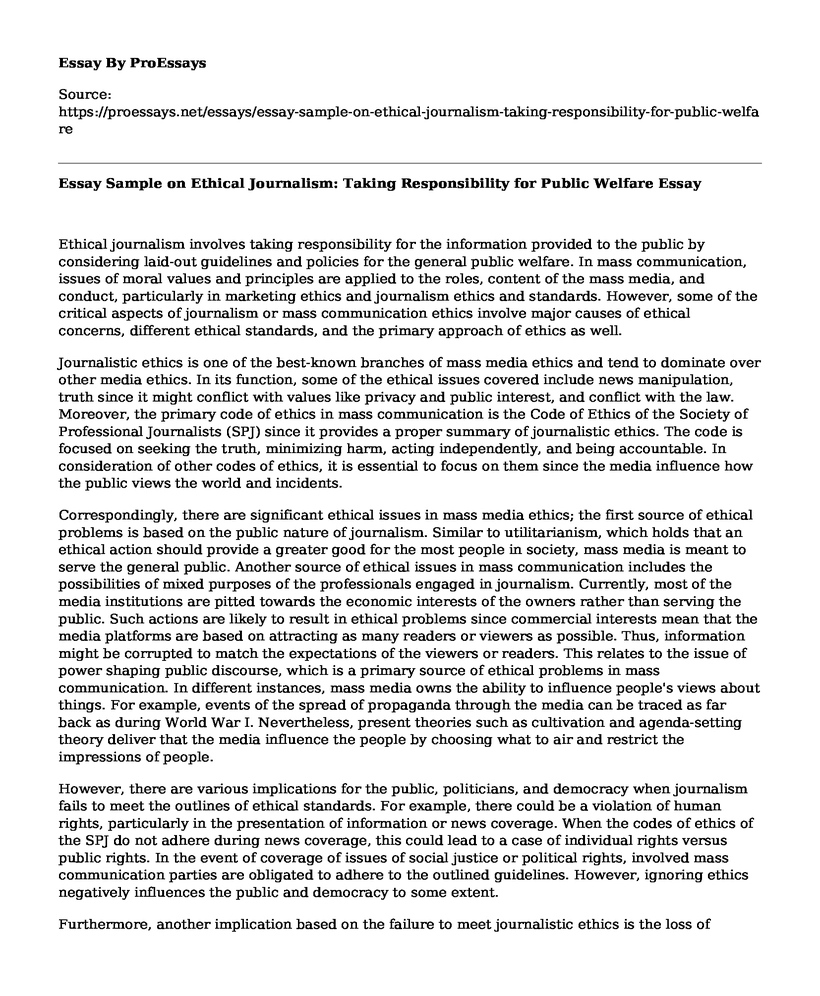Ethical journalism involves taking responsibility for the information provided to the public by considering laid-out guidelines and policies for the general public welfare. In mass communication, issues of moral values and principles are applied to the roles, content of the mass media, and conduct, particularly in marketing ethics and journalism ethics and standards. However, some of the critical aspects of journalism or mass communication ethics involve major causes of ethical concerns, different ethical standards, and the primary approach of ethics as well.
Journalistic ethics is one of the best-known branches of mass media ethics and tend to dominate over other media ethics. In its function, some of the ethical issues covered include news manipulation, truth since it might conflict with values like privacy and public interest, and conflict with the law. Moreover, the primary code of ethics in mass communication is the Code of Ethics of the Society of Professional Journalists (SPJ) since it provides a proper summary of journalistic ethics. The code is focused on seeking the truth, minimizing harm, acting independently, and being accountable. In consideration of other codes of ethics, it is essential to focus on them since the media influence how the public views the world and incidents.
Correspondingly, there are significant ethical issues in mass media ethics; the first source of ethical problems is based on the public nature of journalism. Similar to utilitarianism, which holds that an ethical action should provide a greater good for the most people in society, mass media is meant to serve the general public. Another source of ethical issues in mass communication includes the possibilities of mixed purposes of the professionals engaged in journalism. Currently, most of the media institutions are pitted towards the economic interests of the owners rather than serving the public. Such actions are likely to result in ethical problems since commercial interests mean that the media platforms are based on attracting as many readers or viewers as possible. Thus, information might be corrupted to match the expectations of the viewers or readers. This relates to the issue of power shaping public discourse, which is a primary source of ethical problems in mass communication. In different instances, mass media owns the ability to influence people's views about things. For example, events of the spread of propaganda through the media can be traced as far back as during World War I. Nevertheless, present theories such as cultivation and agenda-setting theory deliver that the media influence the people by choosing what to air and restrict the impressions of people.
However, there are various implications for the public, politicians, and democracy when journalism fails to meet the outlines of ethical standards. For example, there could be a violation of human rights, particularly in the presentation of information or news coverage. When the codes of ethics of the SPJ do not adhere during news coverage, this could lead to a case of individual rights versus public rights. In the event of coverage of issues of social justice or political rights, involved mass communication parties are obligated to adhere to the outlined guidelines. However, ignoring ethics negatively influences the public and democracy to some extent.
Furthermore, another implication based on the failure to meet journalistic ethics is the loss of credibility by a particular media outlet. In cases where ethical guidelines are not adhered to or not followed at all, this could include aggravation of already horrid circumstances, misinformation that could harm people unjustifiably, or even stereotyping. In either of the outcomes, this could result in impacts for politicians and the public as a whole due to biased information. When a particular media outlet loses credibility, this could lead to misunderstanding or other problems since people cannot distinguish what is factual and what is not.
Cite this page
Essay Sample on Ethical Journalism: Taking Responsibility for Public Welfare. (2023, Apr 24). Retrieved from https://proessays.net/essays/essay-sample-on-ethical-journalism-taking-responsibility-for-public-welfare
If you are the original author of this essay and no longer wish to have it published on the ProEssays website, please click below to request its removal:
- Left Wing Media Bias Essay Example
- The True Damage to Trump's 'Fake News' - Article Analysis Assignment
- Fake News Discussion
- What Persuasive Strategies Make the Fake News Seem to Be True? - Paper Example
- Interview to Nurture the Potential of the Aging Interviewee Paper Example
- Covid-19: Adapting to a New Revolution in Business Strategies.
- Ethics in Journalism: A Guide for Reporters - Essay Sample







